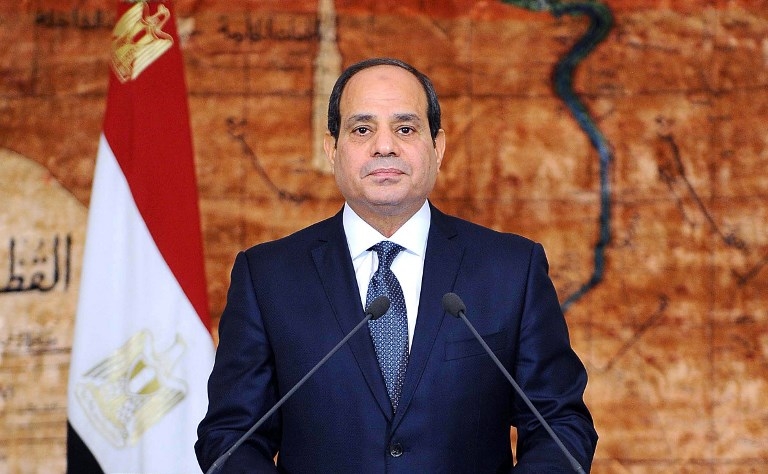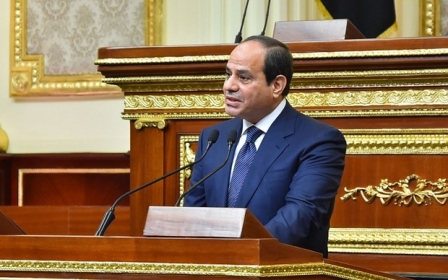Egypt adjourns hearing on constitutional change to extend Sisi tenure

An Egyptian court has postponed hearing a case that would have the country's parliament discuss constitutional amendments allowing president Abdel Fattah el-Sisi to stay in power after the end of his second term in 2022.
The Cairo Court for Urgent Matters, led by judge Wael Abu Shadi, decided on Sunday to postpone the case until 24 February, pending the plaintiff’s submission of supportive documents.
Pro-Sisi lawyer Ayman Abd al-Hakim filed the case in December “on behalf of a number of citizens” to demand changes to Article 140 of the Egyptian constitution, which he said was “unfair to the great Egyptian people” who are “the source of powers”.
The plaintiff dismissed Article 140 as “a heresy created by the constitutional committee to simulate Western countries despite the different circumstances in different countries”.
The proposed amendment to Article 140, which limits presidents to two four-year terms, would allow Sisi to extend his time in office if voters approve the amendment in a popular referendum.
The amendments, however, have to be formally proposed by either the president or 20 percent of MPs, according to Article 226 of the current constitution.
In response to reports on the lawsuit, parliament spokesperson Salah Hasaballah said that parliament had not received any formal requests related to amending the constitution, but that it would consider any amendments in accordance with Article 226.
“The House of Representatives cannot unilaterally decide to amend the constitution. The people own the decision to do so through a popular referendum," he said during a press conference on 10 January.
‘A crime against the January revolution’
Efforts to extend Sisi’s presidential term beyond his 2022 limit have previously been widely reported and were not denied by the president.
On 13 January, the Civil Democratic Movement consisting of seven liberal and leftist parties issued a statement dismissing the proposed amendments as “a coup attempt against the constitution” seeking to strip Egyptians of their democratic gains.
Earlier in January, nearly a thousand Egyptian public figures signed a petition declaring their rejection of calls to amend the constitution to extend Sisi’s term.
“Promoting this absurdity will deepen the legitimacy crisis suffered by the current regime as a result of its continuous neglect and violation of many constitutional articles, such as the expropriation of Egyptian land in Tiran and Sanafir and [failure to uphold] constitutional articles related to transitional and social justice,” the petition read.
Many well-known public figures signed the petition, including activist and member of the National Council for Human Rights George Ishak, novelist Alaa al-Aswany, scholar Taqadum al-Khatib and former April 6 leader Israa Abdel Fattah.
Even Mohammed El Baradei, who briefly served as interim vice president of Egypt after the 2013 coup, reacted on social media.
Translation: In repressive regimes, the ruler squanders the constitution; the ‘honourable’ tailors design a constitution with the size of the ruler; and in the end, the constitution is undermined and the ruler fails. Since the revolution, there have been endless attempts to turn the constitution into a tool for control rather than a guarantor for people’s rights and liberties…
Ayman Nour, former presidential candidate and liberal Egyptian politician, condemned the proposed amendment as “a grave crime that would undermine the last gain of the January 2011 revolution” related to limiting terms of office for presidents.
However, he said he was optimistic that Sisi would not remain in power perpetually, citing similar attempts by his predecessors Hosni Mubarak and Anwar Sadat to amend the constitution to stay in power for unlimited periods.
“Historically, no Egyptian president benefited from constitutional amendments seeking to perpetuate their rule,” Nour told Middle East Eye last month.
The petition to amend Article 140 comes amid reports that a plan to change the constitution would be put into motion this spring and that Sisi’s son, Mahmoud, had been tasked with pushing it through.
The plan, according to a report by the Egyptian news site Mada Masr, seeks to change the amendment to extend the presidential term to six years and is scheduled to be drafted by March 2019.
New MEE newsletter: Jerusalem Dispatch
Sign up to get the latest insights and analysis on Israel-Palestine, alongside Turkey Unpacked and other MEE newsletters
Middle East Eye delivers independent and unrivalled coverage and analysis of the Middle East, North Africa and beyond. To learn more about republishing this content and the associated fees, please fill out this form. More about MEE can be found here.




